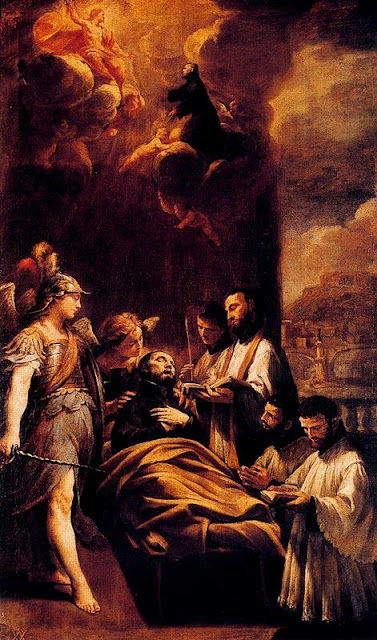St Cajetan is known as the Patron of the unemployed and job seekers because he and the order he founded, the Theatines, relied entirely on Divine Providence for sustinence and daily living. Thus by freeing themselves from the shackles of worldly wealth they managed to serve the poor with much more effectiveness since they shared in their poverty, living from day to day. It also meant that they distanced themselves from the corruption and nepotism that unfortunately was common in the 16th century church.
Furthermore St Cajetan set up the first "Monte Pio" which is a kind of bank which gives loans on the security of pawned objects but does not charge interest. Thus he helped the poor of Naples who were being forced further into poverty by loan sharks who abounded in that city and charged such high interest that many became trapped in a spiral of debt.
One story is told about Don Gaetano’s trust in God’s Providence: The church of San Nicola da Tolentino, Naples was given to the Theatines to care for. Don Gaetano had already done his utmost to trim from the convent budget so he could invest more in the temple’s care and embellishment, but at one point, the debts were too much to balance the alms given them. So a debt deadline came up which could not be honoured and he had to humbly ask for an extension. The new date came and went with the same situation, still no money and Don Gaetano having to resort to asking for Divine intervention. A few moments before the creditor was scheduled to arrive, a young man of handsome appearance showed up and without a word dropped a packet in Don Gaetano’s hands and with a salute, left. At the very moment the young man exited, the creditor came in with a sour face. Don Gaetano had the inspiration not to say a word but to open the parcel. In it was the exact amount of money owed. The beautiful story could end here, but the creditor who brushed past the handsome youth on his way in, saw the face of Gaetano shine and silently looked for an answer to the hard hearted question he had in mind. By and by all his profit making intentions melted away and he was moved to remorse, admiration and love. He replaced the money in the priest’s hands saying
“In my hands, this is just money but in yours it is the fruit of God’s grace”.
Let us pray that so many who are struggling with unemployment, debt and uncertainty in these difficult times will find their problems resolved and their prayers heard, and that in imitation of St Cajetan our societies and governments may find more just and merciful financial methods which help all, not only the greedy few.
As the Holy Father said during his UK visit, a moral failure was to blame for the global financial crisis.
He said:
'There is widespread agreement that the lack of a solid ethical foundation for economic activity has contributed to the grave difficulties now being experienced by millions of people throughout the world.'
And he said that, just as governments had come to the rescue of the banks, judged 'too big to fail', they must now act to help the world's poorest people.
He said: 'Here is an enterprise, worthy of the world's attention, that is truly "too big to fail".'
The miraculous statue of St Cajetan in Liniers, Buenos Aires
















